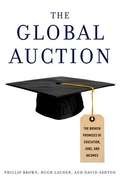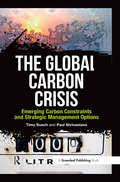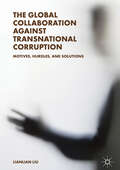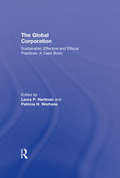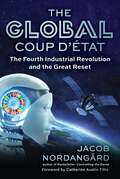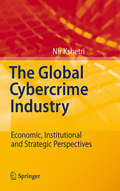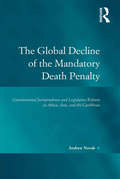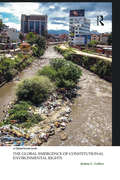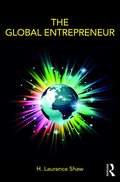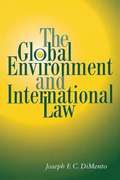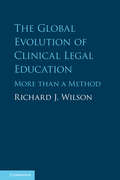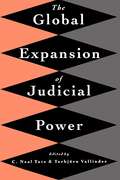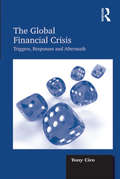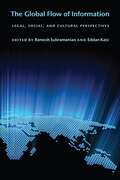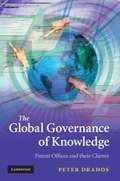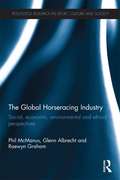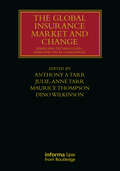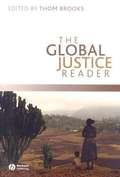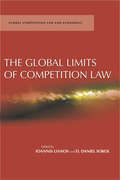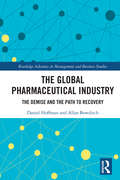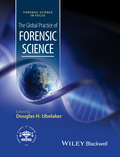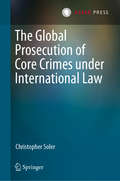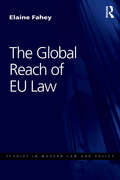- Table View
- List View
The Global Auction: The Broken Promises of Education, Jobs, and Incomes
by David Ashton Phillip Brown Hugh LauderFor decades, the idea that more education will lead to greater individual and national prosperity has been a cornerstone of developed economies. Indeed, it is almost universally believed that college diplomas give Americans and Europeans a competitive advantage in the global knowledge wars. Challenging this conventional wisdom, The Global Auction forces us to reconsider our deeply held and mistaken views about how the global economy really works and how to thrive in it. Drawing on cutting-edge research based on a major international study, the authors show that the competition for good, middle-class jobs is now a worldwide competition--an auction for cut-priced brainpower--fueled by an explosion of higher education across the world. They highlight a fundamental power shift in favor of corporate bosses and emerging economies such as China and India, a change that is driving the new global high-skill, low-wage workforce. Fighting for a dwindling supply of good jobs will compel the middle classes to devote more time, money, and effort to set themselves apart in a bare-knuckle competition that will leave many disappointed. The authors urge a new conversation about the kind of society we want to live in and about the kind of global economy that can benefit workers, but without condemning millions in emerging economies to a life of poverty. The Global Auction is a radical rethinking of the ideas that stand at the heart of the American Dream. It offers a timely exposé of the realities of the global struggle for middle class jobs, a competition that threatens the livelihoods of millions of American and European workers and their families.
The Global Body Market
by Michele GoodwinThe dark side of body part trading operates in a dynamic fashion, full of mystery, intrigue, and ambition. On the one hand, black and gray markets are illegal, but also pioneering and inventive; and although this type of criminal activity requires a level of dexterity and innovation, the point should not be lost that these markets thrive and flourish, sometimes in view of law. On the other hand, altruistic body part procurement is mired by low participation, which encourages black market transactions. Thousands of sick patients die each year without the hope of receiving an organ or bone marrow donation through the altruistic procurement system, so they turn to the dark side. This book offers a frank conversation about altruism in the global body market. It exposes how researchers exploit their patients' ignorance to harvest tissue samples, blood, and other biologics without consent for research and patent development. The book chronicles exploitation in the name of altruism, including the nonconsensual use of children in dangerous clinical trials, and analyzes social and legal commitments to the value of altruism - offering an important critique of the vulnerability of altruism to corruption, coercion, pressure, and other negative externalities.
The Global Carbon Crisis: Emerging Carbon Constraints and Strategic Management Options
by Paul Shrivastava Timo BuschFor at least a decade the science of climate change has warned us of the dire need for action – particularly by corporations who are the main engines of economic production and consumption. Yet managerial and corporate understanding of climate change and related energy issues remains fragmented and present actions lack the urgency this critical problem deserves. There is a whole new economy – the low-carbon economy – looming on the horizon. But our consumption and production patterns remain in a carbon-locked position. What we are risking is a global carbon crisis and a case of history repeating. Humankind's failure to adequately recognise the onset of and address the effects of the global financial crisis mirrors our similar failures with the carbon crisis. There are many parallels: both are and were predictable and both will have direct implications on humanity on a sweeping, indiscriminate and severe scale. The difference is that we cannot reverse the effects of climate change and fossil fuel scarcity as easily as we can repair the global financial system. It is of paramount importance that we wake up to the risks and begin tackling the issues early enough. To successfully address the risks, business needs to be aware of the consequences that a changing climate and finite carbon resources will have on their business performance. The element carbon – both as a resource and as an emission – is both an economic threat as well as an opportunity for companies. It is a threat for carbon-intense production systems that will need to be changed to avoid further harmful climatic change, and take into account the limited availability of carbon-based fuels. At the same time, new opportunities will emerge for companies who can creatively design and produce goods and services that fit the new emerging carbon-constrained business environment. Many sectors of the economy – for example, renewable energy, energy and resources conservation, waste reduction and management, carbon finance markets – will expand rapidly, as other carbon- and resource-intensive sectors decline. The Global Carbon Crisis succinctly translates important insights from the natural sciences, economics and equity discussions, for the business reader. It reviews important aspects of these discussions and clarifies misunderstandings with respect to climate change and fossil fuel availability and their implications for business. The book provides simple, direct, pragmatic and effective solutions that policy-makers and corporate managers can implement. The aim is to provoke action – thoughtful action – towards developing a low-carbon future for companies on three levels. At the macro level, the authors discuss the importance of tough industrial policies for climate change and propose the idea of an international carbon-equal fund. At the meso level, they elaborate on the role of inter-firm collaborations for establishing low-carbon industries and production systems. At the micro level, they illustrate the virtue of proactive carbon strategies and suggest a corporate carbon management framework. Getting the message of the carbon crisis across to a business audience has proved challenging. This book successfully makes the case that they are intricately connected to one another and practising managers and business students will benefit from viewing the carbon crisis in parallel to the financial meltdown. The book will be essential reading for all businesses grappling with carbon-related issues and for many in academia, including those in management, strategy, finance, corporate social responsibility and sustainable development, globalisation and innovation studies.
The Global Collaboration against Transnational Corruption: Motives, Hurdles, and Solutions
by Lianlian LiuThis book articulates and explores the realities of contemporary international anti-corruption law. As corruption has increasingly become a major topic in international affairs, Liu analyzes the global collaboration against transnational bribery. As China's economic reforms are increasingly articulated in a language of law, governmentality, and anti-corruption, it is essential that scholars, policymakers and legal theorists around the world understand the issues at stake. In this elegant text, Liu lays out the issues clearly, establishes methodologies for analysis, and provides policy proposals for the years to come.
The Global Corporation: Sustainable, Effective and Ethical Practices, A Case Book
by Patricia H. Werhane Laura P. HartmanThis text brings together case studies focusing on specific instances of corporate best practices. All too often, we showcase cases based on questionable or unethical corporate behavior. Instead, the editors bring together in this book examples of how some firms got it right. Certainly, there is no claim that the companies in these case are perfect; some of them may have histories that include questionable practices. But, these are companies that work to foster trust, both internally and in their relationships with customers, suppliers, shareholders, and the communities in which they operate. The book is not, however, merely a descriptive iteration of effective corporate conduct. The editors conclude with an analysis of frameworks for corporate and managerial ethical decision-making - frameworks that help to establish models for best practices. These frameworks then can be generalized and applied to other corporate situations, and replicated by other companies in their search for excellence and the resulting avoidance of misconduct.
The Global Coup d'État: The Fourth Industrial Revolution and the Great Reset
by Jacob NordangårdWe are in the midst of a devastating takeover of our world. The Global Coup d'État shows how, why, and what we can do to stop it. The year 2020 will go down in history as the year when the global coup d'état was initiated. In a historical context, the COVID-19 crisis, the murder of George Floyd by a police officer and subsequent riots, mass protests against government lockdowns, and the 2020 election appear rather as part of a well-directed chess game, with complete control of the whole planet as the final goal. During the crescendo of this drama, the powers behind the coup emerged quite openly, offering a techno–totalitarian and very far-reaching solution to the world. This solution, which they call the Great Reset, means that mankind must be fully integrated and merged with a worldwide technological system, through the application of the technologies of the Fourth Industrial Revolution—all for our own safety, security, and well-being. Most people probably associate the phrase &“coup d'état&” with a sudden, violent takeover, with tanks around government buildings, takeover of media channels, purges of dissidents, arrests, and so on. But this is not always the case. The usurpers can also seize power without violence, in a completely legal and democratic way, with the consent or even enthusiasm of the people, as evidenced in 2020. There are many &“existential threats&” (climate crisis, refugee crises, terrorism, pandemics, etc.) that can be used to establish a firmer and more centralized governance. This can be a gradual process, barely perceivable until it&’s almost a fait accompli. In The Global Coup d'État, author and researcher Jacob Nordangård shares the history, describes the process, reveals the methods, and identifies the agents of this worldwide takeover so that we can take action before it is too late.
The Global Cybercrime Industry
by Nir KshetriThis book is about the global cybercrime industry, which according to some estimates, is a US$1 trillion industry and is growing rapidly. It examines economic and institutional processes in the cybercrime industry, provides insights into the entrepreneurial aspect of firms engaged in cyber-criminal activities, takes a close look at cybercrime business models, explains the global variation in the pattern of cybercrimes and seeks to understand threats and countermeasures taken by key actors in this industry. This book's distinguishing features include the newness, importance, controversiality and complexity of the topic; cross-disciplinary focus, orientation and scope; theory-based but practical and accessible to the wider audience; and illustration of various qualitative and quantitative aspects of the global cybercrime industry.
The Global Decline of the Mandatory Death Penalty: Constitutional Jurisprudence and Legislative Reform in Africa, Asia, and the Caribbean (Law, Justice and Power)
by Andrew NovakHistorically, at English common law, the death penalty was mandatory for the crime of murder and other violent felonies. Over the last three decades, however, many former British colonies have reformed their capital punishment regimes to permit judicial sentencing discretion, including consideration of mitigating factors. Applying a comparative analysis to the law of capital punishment, Novak examines the constitutional jurisprudence and resulting legislative reform in the Caribbean, Sub-Saharan Africa, and South and Southeast Asia, focusing on the rapid retreat of the mandatory death penalty in the Commonwealth over the last thirty years. The coordinated mandatory death penalty challenges - which have had the consequence of greatly reducing the world’s death row population - represent a case study of how a small group of lawyers can sponsor human rights litigation that incorporates international human rights law into domestic constitutional jurisprudence, ultimately harmonizing criminal justice regimes across borders. This book is essential reading for anyone interested in the study and development of human rights and capital punishment, as well as those exploring the contours of comparative criminal justice.
The Global Emergence of Constitutional Environmental Rights (Law, Justice and Ecology)
by Joshua C. GellersOver the past 40 years, countries throughout the world have similarly adopted human rights related to environmental governance and protection in national constitutions. Interestingly, these countries vary widely in terms of geography, politics, history, resources, and wealth. This raises the question: why do some countries have constitutional environmental rights while others do not? Bringing together theory from law, political science, and sociology, a global statistical analysis, and a comparative study of constitutional design in South Asia, Gellers presents a comprehensive response to this important question. Moving beyond normative debates and anecdotal developments in case law, as well as efforts to describe and categorize such rights around the world, this book provides a systematic analysis of the expansion of environmental rights using social science methods and theory. The resulting theoretical framework and empirical evidence offer new insights into how domestic and international factors interact during the constitution drafting process to produce new law that is both locally relevant and globally resonant. Scholars, practitioners, and students of law, political science, and sociology interested in understanding how institutions cope with complex problems like environmental degradation and human rights violations will find this book to be essential reading.
The Global Entrepreneur
by H. Laurence ShawFollowing the 2008 global financial crisis, entrepreneurship has never been more vital. As jobs were lost from large organizations, most new jobs came from innovative startups. The lure of hi-tech has attracted many people who see themselves as future entrepreneurs, but who lack the perspective of the total experience. To meet this demand, community colleges and universities across the world have set up entrepreneurship courses. The Global Entrepreneur is a life-changing book. To leave the comfort of a steady job and enter the tumultuous world of the entrepreneur is a major and often fearful step. For those who are contemplating this change, or who have already embarked upon this exciting venture, reassurance based on the experience of both successful and even not so successful entrepreneurs can be invaluable. The book provides an overview of the entrepreneurial experience broken down into all of its essential elements. Today, startups are global in nature and the book helps a budding entrepreneur understand the effect of different cultures both on the company and his/herself. This book differs from the existing literature in that its focus is on the individual and his or her reaction to the international nature of the entrepreneurial experience backed by both the lived experience of actual entrepreneurs and case studies of entrepreneurship across the world. Business success is measured by financial return. The book will be a vital tool in this endeavour. This book will appeal to students of business or management and individuals who are considering a career change, to create or join a startup, and need more knowledge to make their decision.
The Global Environment and International Law
by Joseph F. C. DimentoInternational law has become the key arena for protecting the global environment. Since the 1970s, literally hundreds of international treaties, protocols, conventions, and rules under customary law have been enacted to deal with such problems as global warming, biodiversity loss, and toxic pollution. Proponents of the legal approach to environmental protection have already achieved significant successes in such areas as saving endangered species, reducing pollution, and cleaning up whole regions, but skeptics point to ongoing environmental degradation to argue that international law is an ineffective tool for protecting the global environment.
The Global Evolution of Clinical Legal Education: More than a Method
by Wilson Richard J.Globally, the methodologies of legal education have not changed in any fundamental way, some methods dating back hundreds of years. Law schools have relied, for too long, on passive learning methods such as lectures or cases. Clinical legal education provides an alternative that is more than just another pedagogical method. It provides a way for students to experience their emerging professional selves, while providing services or projects with poor and underrepresented clients. This book documents both the historical origins of clinical experiments in the earliest days of US university legal education, and the now-global reach of clinical pedagogy as a proven tool for effective training of legal professionals.
The Global Expansion of Judicial Power
by Torbjorn Vallinder C Neal TateEssays examining the trend of expanding judicial powers in government around the world. In Russia, as the confrontation over the constitutional distribution of authority raged, Boris Yeltsin&’s economic program regularly wended its way in and out of the Constitutional Court until Yeltsin finally suspended that court in the aftermath of his clash with the hardline parliament. In Europe, French and German legislators and executives now routinely alter desired policies in response to or in anticipation of the pronouncements of constitutional courts. In Latin America and Africa, courts are—or will be—important participants in ongoing efforts to establish constitutional rules and policies protect new or fragile democracies from the threats of military intervention, ethnic conflict, and revolution. This global expansion of judicial power, or judicialization of politics is accompanied by an increasing domination of negotiating or decision-making arenas by quasi-judicial procedures. For better or for worse, the judicialization of politics has become one of the most significant trends of the end of the millennium. In this book, political scientists, legal scholars, and judges around the world trace the intellectual origins of this trend, describe its occurrence—or lack of occurrence—in specific nations, analyze the circumstances and conditions that promote or retard judicialization, and evaluate the phenomenon from a variety of intellectual and ideological perspectives.
The Global Financial Crisis: Triggers, Responses and Aftermath
by Tony CiroThis book offers commentary and analysis on the catastrophic events which have recently confronted the international economy in the modern era and contrasts the current situation with other financial crises. It includes case studies on Lehman Brothers in the US, Babcock & Brown in Australia, and Northern Rock in the UK. Asking many pertinent questions about the causes of the crisis and its effects, the book explores fundamental themes such as: asset bubbles and speculation in the financial and non-financial markets, systemic risks and the role of regulation, and regulators. It also reviews the response of international institutions such as the IMF, the World Bank, the US Federal Reserve, the EU Central Bank and the G20. The book assesses the triggers of the crisis and evaluates rescue packages and policy responses as well as suggesting reform of regulatory and supervisory frameworks to maintain banking and modern financial systems in the future.
The Global Flow of Information: Legal, Social, and Cultural Perspectives (Ex Machina: Law, Technology, and Society #5)
by Ramesh Subramanian Eddan KartzThe Internet has been integral to the globalization of a range of goods and production, from intellectual property and scientific research to political discourse and cultural symbols. Yet the ease with which it allows information to flow at a global level presents enormous regulatory challenges. Understanding if, when, and how the law should regulate online, international flows of information requires a firm grasp of past, present, and future patterns of information flow, and their political, economic, social, and cultural consequences.In The Global Flow of Information, specialists from law, economics, public policy, international studies, and other disciplines probe the issues that lie at the intersection of globalization, law, and technology, and pay particular attention to the wider contextual question of Internet regulation in a globalized world. While individual essays examine everything from the pharmaceutical industry to television to “information warfare” against suspected enemies of the state, all contributors address the fundamental question of whether or not the flow of information across national borders can be controlled, and what role the law should play in regulating global information flows.Contributors: Frederick M. Abbott, C. Edwin Baker, Jack M. Balkin, Dan L. Burk, Miguel Angel Centeno, Dorothy E. Denning, James Der Derian, Daniel W. Drezner, Jeremy M. Kaplan, Eddan Katz, Stanley N. Katz, Lawrence Liang, Eli Noam, John G. Palfrey, Jr., Victoria Reyes, and Ramesh Subramanian
The Global Governance of Knowledge
by Peter DrahosPatent offices around the world have granted millions of patents to multinational companies. Patent offices are rarely studied and yet they are crucial agents in the global knowledge economy. Based on a study of forty-five rich and poor countries that takes in the world's largest and smallest offices, Peter Drahos argues that patent offices have become part of a globally integrated private governance network, which serves the interests of multinational companies, and that the Trilateral Offices of Europe, the USA and Japan make developing country patent offices part of the network through the strategic fostering of technocratic trust. By analysing the obligations of patent offices under the patent social contract and drawing on a theory of nodal governance, the author proposes innovative approaches to patent office administration that would allow developed and developing countries to recapture the public spirit of the patent social contract.
The Global Guide to Animal Protection
by Archbishop Desmond Tutu Andrew LinzeyRaising awareness of human indifference and cruelty toward animals, The Global Guide to Animal Protection includes more than 180 introductory articles that survey the extent of worldwide human exploitation of animals from a variety of perspectives. In addition to entries on often disturbing examples of human cruelty toward animals, the book provides inspiring accounts of attempts by courageous individuals--including Jane Goodall, Shirley McGreal, Birute Mary Galdikas, Richard D. Ryder, and Roger Fouts--to challenge and change exploitative practices. As concern for animals and their welfare grows, this volume will be an indispensable aid to general readers, activists, scholars, and students interested in developing a keener awareness of cruelty to animals and considering avenues for reform. Also included is a special foreword by Archbishop Desmond Tutu, urging readers to seek justice and protection for all creatures, humans and animals alike.
The Global Horseracing Industry: Social, Economic, Environmental and Ethical Perspectives (Routledge Research in Sport, Culture and Society)
by Phil McManus Glenn Albrecht Raewyn GrahamHorseracing, thoroughbred breeding and gambling on racing are global industries worth several hundred billion dollars. They are also industries facing serious challenges, from the rise of alternative forms of leisure gambling to concerns about the ethical treatment of animals in all equestrian sports. This book offers a broad-ranging examination of the contemporary horseracing industry, from geographical, economic, social, ethical and environmental perspectives. The book draws on in-depth, mixed-method research into the racing and breeding industries in the US, Australia, the UK, Canada and New Zealand, and includes comparative material on other key racing centres, such as Ireland, Singapore and Hong Kong. It explores the economic structure of the global racing business, including comparisons with other major international sport businesses and other equestrian sports. It examines the social and cultural roots of the sport through its association with, and impact on, rural places, communities and environments from Kentucky to Newmarket – highlighting racing’s particular blend of tradition and scientific and technological innovation. The book also explores the ethical issues at the heart of horseracing, from reproduction to the use of the whip, and the inescapable tension between the horse as an instrumentally valuable commodity and the horse as an intrinsically valuable animal with needs and interests. The Global Horseracing Industry concludes by considering alternative futures for this major international sports business. The book is illuminating reading for anybody with an interest in sport, business, cultural geography, animal studies, or environmental studies.
The Global Insurance Market and Change: Emerging Technologies, Risks and Legal Challenges (Lloyd's Insurance Law Library)
by Anthony A Tarr, Julie-Anne Tarr, Maurice Thompson and Dino WilkinsonThis book focuses on the global landscape in which insurance is transacted, and where it is evolving, driven from within by transformative technologies and externally by the necessity to address risks like climate change and health crises, such as the COVID-19 pandemic. It discusses the dynamic challenges and opportunities that lie ahead for the industry in areas such as on-demand insurance, embedded insurance, parametric insurance, autonomous vehicles, the rise of fintech, the cyber risk landscape and through initiatives driven by distributed ledger technology or blockchain solutions. Moreover, it covers the major external challenges confronting the global insurance market, such as the growing insurance protection gap in relation to the affordability and insurability of natural catastrophes and climate change, and pandemics like COVID-19. This book examines innovations in insurance driven by the industry as well as externally imposed changes and dynamics impacting the industry. It describes these changes, the industry’s responses and the legal framework in which they occur. It canvasses additional regulatory and law reform initiatives that may be necessary to achieve an effective balance between the various competing interests. The book is the first to address these matters holistically with a particular focus upon insurance law, it will describe these changes and industry responses and the legal framework in which they occur. The Global Insurance Market will be directly relevant to legal professionals, insurers, insurtechs, fintechs, brokers, CEOs of insurance companies, risk managers, legal counsel, academics, researchers, the judiciary, and policy makers. It will also serve as a valuable resource for students of all levels.
The Global Justice Reader
by Thom BrooksThe Global Justice Reader is a first-of-its kind collection that brings together key foundational and contemporary writings on this important topic in moral and political philosophy. Offers a brief introduction followed by important readings on subjects ranging from sovereignty, human rights, and nationalism to global poverty, terrorism, and international environmental justice. Presents the writings of key figures in the field, including Thomas Hobbes, Immanuel Kant, John Rawls, Thomas Pogge, Peter Singer, and many others.
The Global Limits of Competition Law
by Ioannis Lianos D. Daniel SokolOver the last three decades, the field of antitrust law has grown increasingly prominent, and more than one hundred countries have enacted competition law statutes. As competition law expands to jurisdictions with very different economic, social, cultural, and institutional backgrounds, the debates over its usefulness have similarly evolved. This book, the first in a new series on global competition law, critically assesses the importance of competition law, its development and modern practice, and the global limits that have emerged. This volume will be a key resource to both scholars and practitioners interested in antitrust, competition law, economics, business strategy, and administrative sciences.
The Global Pharmaceutical Industry: The Demise and the Path to Recovery (Routledge Advances in Management and Business Studies)
by Daniel Hoffman Allan BowditchThe pharmaceutical industry, long thought of as a recession-proof investment, now faces a day of reckoning. The reasons for this impending downfall are not hard to discern. The prices the industry charges for its prescription drugs have escalated at four to five times the cost-of-living increases during the past two decades and have reached a point where 30% of Americans must choose between filling a prescription, paying for housing, and buying food. This has brought about public pressure on governments around the world to control drug prices, yet the world’s twenty largest pharma companies realized 80% of their growth as a result of exorbitant price hikes. Pharma currently enjoys its extraordinary profitability by exploiting the world’s most vulnerable populations. Yet even their ability to increase prices in the face of falling demand does not satisfy their profit demands. The breadth and depth of pharma’s marketing transgressions exceed those of any other industry and have now reached a point where authorities around the world have found it necessary to take legal action against its violations. Drastic change is needed if the pharmaceutical industry can equitably advance the health of the world’s population and regain public esteem. This book illustrates the range and extent of pharma’s violations and addresses the actions that should be implemented in order to make the drug industry a more constructive, less venal part of contemporary society. It will be of interest to researchers, academics, practitioners, and students with an interest in the pharmaceutical industry, healthcare management, regulation, and bioethics.
The Global Practice of Forensic Science (Forensic Science in Focus)
by Douglas H. Ubelaker Daniel A. MartellThe Global Practice of Forensic Science presents histories, issues, patterns, and diversity in the applications of international forensic science. Written by 64 experienced and internationally recognized forensic scientists, the volume documents the practice of forensic science in 28 countries from Africa, the Americas, Asia, Australia and Europe. Each country’s chapter explores factors of political history, academic linkages, the influence of individual cases, facility development, types of cases examined, integration within forensic science, recruitment, training, funding, certification, accreditation, quality control, technology, disaster preparedness, legal issues, research and future directions. Aimed at all scholars interested in international forensic science, the volume provides detail on the diverse fields within forensic science and their applications around the world.
The Global Prosecution of Core Crimes under International Law
by Christopher SolerThis book deals with the prosecution of core crimes and constitutes the first comprehensive analysis of the horizontal and vertical systems of enforcement of international criminal law and of their inter-relationship. It provides a global jurisprudential exposition in assessing the grounds for refusal of surrender to the International Criminal Court and of extradition to another State. It also offers insights into legal perspectives which improve the prevailing enforcement regimes of various models of criminal justice, including hybrid criminal tribunals, special criminal courts, judicial panels and partnerships, and other budding sui generis judicial and/or prosecutorial institutions. The book espouses a human rights law-oriented critique to the enforcement of domestic, regional and international criminal justice and is aimed at legal practitioners (prosecutors, defence lawyers, magistrates and judges), jurists, criminal justice experts, penologists, legal researchers, human rights activists and law students.Christopher Soler lectures Maltese criminal law, international criminal law and public international law at the University of Malta. He obtained his Ph.D. from the University of Amsterdam in The Netherlands.
The Global Reach of EU Law (Studies in Modern Law and Policy)
by Elaine FaheyThe EU strives to be a leading rule-making organisation with global reach in both economic and non-economic fields. But how should we understand the science behind this? This book focuses upon unpacking the uncertainty, the form and directions of the global reach of EU law, as a distinctive form of post-national rule-making. The work examines two central themes: the conceptual development of the global reach and effects of EU law; and the methodology of EU rule-making processes. It considers what specific impact and effects the EU’s rules are having, and its approach to global reach. The book studies the EU’s Area of Freedom, Security and Justice (AFSJ) as a case of a non-economic field offering examples of ways and means in which the global reach of EU law can manifest itself in an evolving and sensitive field. Using this casestudy, the book develops a sharper focus upon the ‘internal’ and ‘external’ elements of EU law which make up our understanding of the global reach of EU law and develops further why global reach is important as a scientific phenomenon. The book will be a valuable resource for researchers and students in the areas of EU law, global governance and the study of law beyond the nation state.
